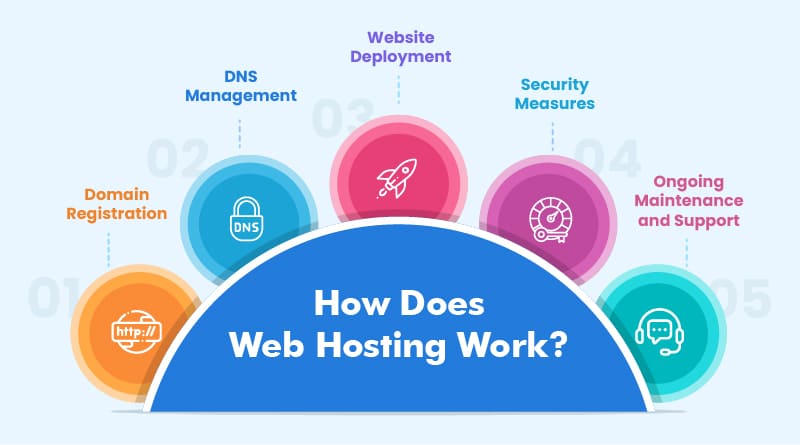Have you ever thought about why the internet never sleeps? What makes websites available anytime, anywhere? The answer lies in web hosting! Wondering what web hosting is? It is the core of storing, managing, and delivering website data over the Internet—it’s the factual web hosting meaning that beginners must know. Selecting the most suitable web hosting service is the key to ensuring seamless performance, speed, and data security for a successful online presence. The web hosting industry is expanding continuously and the global web hosting market is forecasted to reach $267 billion by 2028, addressing the rising demand for premium web hosting solutions.
Different web hosting solutions, from cheap shared hosting to dedicated servers, are available, which cater to diverse business and personal needs. Therefore, it is important to understand the fundamentals of web hosting.
MilesWeb’s scalable and feature-packed web hosting solutions are developed to meet varying needs without affecting website performance and long-term growth in a continuously evolving digital world. So without wasting any time, let’s try to grasp the whole idea of what is web hosting and how it can help you grow your business.
Table Of Content
What is Web Hosting?
Web hosting is a service that a provider offers to the user. In simpler words, the web host assigns space on the webserver for a website for storing its files. Web hosting allows websites and their other relevant files, to be stored on servers and made public online. That means every website you visit or have visited in the past is hosted on a server — a fundamental part of website hosting explained in simple terms.
The space assigned on a server to a website depends upon the web hosting type. So the key web hosting types are shared, VPS, dedicated, reseller, WordPress, and cloud hosting.
They are categorized based on the technology used for the server, the management level offered, and additional benefits. Similarly, it also depends on your website requirements. If your site requires more space and resources, the hosting type will differ.
Plus, It is the responsibility of your web host to keep the server up and running, secure it from online threats and transfer your content such as images, text, files, etc. from the server to the browser of a visitor.
When you have a website hosting service, your website actually receives an existence, it’s how you get a website online. Anyone on the internet can search for your domain, and the server will fetch them the results.
Accordingly, there are thousands and millions of web hosting providers out there. There are even some cheap web hosting services available to fit your budget. But, the most work is done in finding the best hosting provider and a hosting type suitable for your site.
How Does Web Hosting Work?

The web hosting process involves uploading website files from a local computer to a web server. The server resources (hard drive space, RAM, and bandwidth) are assigned to the respective websites.
The server resources are divided based on the type of hosting plan selected. For selecting the perfect hosting plan, you should understand the types of web hosting plans available. It is not complicated if you’re a non-tech-savvy person. The concept can be simplified with a simple and easy-to-understand analogy! Imagine the selection of web hosting is similar to finding an office space:
How do you decide which type of office space is best for your needs?
Would you be comfortable with an open co-working space including a workstation or an office within a business centre?
Are you planning to expand quickly or expect high traffic on your website? Do you want to rent the complete building or build your own space appeal?
Apart from this, you also require other things. Is it easy to access the rooms, which functions are available (high-speed internet, whiteboard, and other facilities), where they are based, and the complete cost?
That will help you meet your demands and decide the type of office.
Key Steps That Explain the Working of Web Hosting
1. Domain Registration
First of all, select a relevant domain name for your website before hosting it. For example, www.milesweb.com will function as an address for your website.
2. Choose a Hosting Provider
Once you select a domain name for your website, the next step is to choose a reliable web hosting company; this is a critical step when learning how to host a website properly. Ut further depends upon your website’s unique demands, such as storage space, bandwidth, safety measures, processing power, and customer support.
3. Server Architecture
After selecting the best web hosting service, the web host will provision your website’s storage on an appropriate server such as shared, VPS, dedicated, or cloud. The hosting plan you select and the needs of your website determine the server type.
4. Migrating Website Files
Once you have selected the appropriate web hosting plan, the next step is to transfer the website files, such as HTML, CSS, images, and so on, from your local device to your hosting server by using FTP, i.e., File Transfer Protocol, or via a control panel like Plesk or cPanel.
5. Database Setup
With the help of tools such as MySQL and PostgreSQL, you can configure your database. If your website or blog is developed on a CMS like WordPress, then a database is necessary for storing and managing content. Configuring a database connection makes sure that your website will operate smoothly.
6. Configuring DNS (Domain Name System) Settings
Configuring a proper DNS setting is essential because when any user types in your domain name, it correctly points to the server where your website is hosted by translating your human-friendly domain name (like: www.milesweb.com) into a corresponding IP address.
7. Website Availability
After completing all the configurations, along with DNS, and they’re fully propagated, your website is ready for global access, ensuring you get a solid website presence. That means when any user types in your domain name, your website will be accessible worldwide.
8. Regular System Updates
A website is by no means a “set it and forget it” project. They necessitate ongoing updates in content as well as in the underlying software. This encompasses monitoring for potential problems, enforcing updated security measures, performing data backups, and optimizing performance.
9. Regulate Incoming Traffic
To handle increasing traffic, you might need to scale up your resources, that is, add more bandwidth, and storage space, or upgrade to a higher hosting plan.
10. Technical Support
If you encounter any issues such as website downtime, slow loading speed, or any other minor issues in your website, then the customer support team will resolve them immediately.
Similarly, below is the comparison of the types of web hosting with office examples:
Types of Web Hosting
Here I brief you about the types and examples of web hosting.
– Shared Hosting
Shared hosting is similar to renting a workstation in a noisy, busy, open-plan office or working space. You get all the modern amenities such as an internet connection, a desk, and stationery. Plus, you also share the space with other co-workers, including the printer, kitchen, and restroom.
It is impossible to make any changes to the space, such as whiteboard installation, etc. Within a shared hosting environment, several users share the same server resources, such as CPU, disk space, and memory. Hence, it is an excellent solution for small businesses, blogs, and personal websites with minimum resource requirements due to its cost-effectiveness and ease of use.
Pros:
- Perfect for beginners and small to medium-sized businesses
- Cost-effective
- Provides sufficient space and resources
- Easy-to-handle control panel
– VPS Hosting
A virtual private server (VPS) is an upgraded form of shared hosting. If you are a medium-sized business, renting an office within a business park is beneficial.
In VPS hosting, users enjoy isolation from each other. They can enjoy an independent hosting environment. Although you share the server with neighbours, you aren’t dependent on them. That means you can make your own customizations and also organize your workstation on your own. Thus, it’s a key benefit when considering what is hosting for a website at the VPS level.
VPS hosting best suits medium-sized websites, eCommerce stores, and large blogs with an increasing number of visitors.
Pros:
- Dedicated resources
- Isolated virtual environment
- Fewer to zero security risks
- Manages high traffic easily
- Root access
Related – VPS Hosting VS Dedicated Hosting
– Dedicated Server
When you rent the complete office building, it is similar to hosting your website on a dedicated server. Being an expensive option, it is best for websites that need reliability and high performance.
Dedicated servers are perfect for high-end websites with lots of traffic. Such websites have a higher need for more resources and private space.
So here, you will enjoy complete physical isolation and control over the dedicated server.
Pros:
- Full control over the server
- Unlimited Hosting
- Higher reliability and security
- Unbeatable performance
– WordPress Hosting
WordPress hosting is a form of shared hosting, but it is exclusive for WordPress site owners.
Your server is pre-configured for WordPress, and you will get the website with pre-installed plugins for vital tasks such as securing and caching.
Due to the highly optimized configuration, your site will load in the fastest way and with fewer issues.
Affordable WordPress hosting plans consist of built-in WordPress tools such as free pre-built WP templates, 1-click WordPress install, a WordPress staging tool, support for PHP versions, and much more.
Thus, WordPress hosting is the best web hosting for beginner-friendly people and offers the best performance for WordPress websites.
Pros:
- Pre-configured for WordPress
- Install web applications in one click
- Economical
– Cloud Hosting
Currently, cloud hosting is the most reliable web hosting solution in the market. Users today are also investing in shared cloud servers to experience the upfront power of cloud hosting with much affordability.
Cloud hosting comprises a cluster of servers. Your files, as well as resources, are replicated on each server.
When one of the cloud servers is busy or faces any issue, your traffic will get automatically routed to another server within the cluster. Therefore, your website will not face any downtime, which is best to run a busy website.
In fact, cloud hosting is best for those who want a more scalable platform in comparison to other web hosting options.
Pros:
- Scalable
- Face no downtime
- Receive resources you pay for (no compromises)
– Reseller Hosting
Reseller hosting is hype in the market. One can start a reseller hosting business and make money out of it. Here users purchase reseller hosting plans from the web hosting provider and resell their resources on custom prices.
The user is free to create custom packages and sell them through their platforms. Many web hosting companies like MilesWeb offer white label reseller hosting that allows you to host unlimited domains with unmetered bandwidth, 24/7 customer support, cPanel, and other compelling features.
Pros:
- Income opportunity
- Builds brand authenticity
- Serves as an additional or side hustle
- Cost friendly
Difference Between Web Hosting and Domain
Apart from signing up for a web hosting service, you require a domain name. Therefore, understanding the web hosting meaning is the foremost step to learn the difference between hosting and domains. Web hosting lets you rent the server space for your site while the domain name acts as your website address.
Every time a user wants to browse your website, they will type the domain in the browser. And your server will transfer the content they requested.
For instance, “MilesWeb.com” is a domain name.
Several web hosting companies offer a free domain name with their web hosting plans. MilesWeb is one of them (terms and conditions apply). Moreover, MilesWeb also has an easy transferring process of the domain. If your domain provider is different, you can transfer it to MilesWeb.
How to Choose the Best Web Host?
It is equally essential to do the research about the web hosting company as you do for hosting services. There are multiple companies that provide web hosting services. However, it is not possible that all of them offer quality.
That is one of the reasons you must do good research.
Many hosting providers offer affordable services, but only a few are quality web hosts. I must say, MilesWeb is one of those few web hosting providers that aim at quality.
However, here are a few steps you can follow to select the best web host for your website.
– Enough Bandwidth
If you are already putting in great efforts to take your business online and reach wider audiences, it is crucial to check the resources your host offers. You must analyze the amount of space they offer. If it is less and your site is loaded with a good number of media, your website can run slow.
– High Uptime
The highest uptime the hosting industry has acknowledged is 99.95 to 99.99%, depending upon the hosting type. If your web host is offering anything less, you know you need to look for a better one.
– Upgrading Options
Starting a business means anticipating growth on every further step. So while choosing a web host, it is crucial to see whether they provide room for you to grow better. You must be able to upgrade anytime you feel there is a need.
Below are some more key points that you can follow –
- Analyze whether they are quality
- Compare the resources offered with different web hosts
- Check whether they are value-for-money
- A good number of benefits
- Check whether they are trusted and has an authentic website
- Try reaching them via email or chat to see if they have a human response
Which Web Hosting Solution is Best For Your Website?
The answer depends upon your website requirements. If it is small to medium-sized, the site will not have many needs. In this case, shared hosting will work perfectly.
Shared hosting is the best web hosting for beginners. It enables you to host a personal site, portfolio site, blog, and small to a medium business website.
It will offer several plans with a varied amount of resources. According to your website requirements, you can select one.
Similarly, a high-traffic website can opt for VPS or a dedicated server. VPS and dedicated servers differ in the number of resources they offer. Otherwise, they are equally powerful for growing websites.
Dedicated servers work well with heavy websites that need physical isolation and more resources; it is how the premium tier in web hosting explained. It offers higher privacy and security. Although they are expensive, they help in the utmost growth.
So choosing the right hosting plan depends upon your website needs.
MilesWeb Web Hosting Services
MilesWeb offers all web hosting services, from shared hosting to dedicated and cloud servers, helping newbies understand how to host a website seamlessly. They are a leading web host in the hosting industry.
Shocking but true—MilesWeb’s top-notch web hosting services are at a price lower than your favorite burger—making reliable web hosting truly affordable.
If you’re just starting out, sign up for their shared hosting plans, which start from $1 per month after a discount of 80%; for more sophisticated needs, you can choose VPS hosting services, which start from $6.89 per month after a 49% discount, and dedicated servers are available from $78 per month.
With frequent discounts, you can save a good amount of money.
How to Purchase Web Hosting Services from MilesWeb?
The steps to purchase a suitable web hosting plan from MilesWeb is easy. You can simply follow the steps shown in our Knowledge-based article on How to Buy Hosting from MilesWeb?
Web hosting is the foundation of every website, providing effortless accessibility, security, and performance. Whether you’re starting a personal blog or running a high-traffic eCommerce website, selecting the appropriate hosting service is essential for website presence and growth. From shared hosting for starters to high-performance dedicated servers for established businesses with a lot of traffic, web hosting explained in detail above covers it all.
With trusted web hosts like MilesWeb, you receive strong hosting solutions, 24/7/365 support, and affordable plans designed to suit your needs. As the web environment continues to change, proper investment in the appropriate web hosting service will lay the ground for your success online.
FAQs
Why do I need web hosting for my website?
Every website needs a server that safeguards and delivers its content to users for access around the clock. You need web hosting, as it is an inseparable part of your website, which provides internet connectivity. Without hosting, your domain name has no content to serve.
Is free web hosting a good option for a new website?
Free hosting sounds appealing but comes with no reliable web hosting features such as uptime guarantees, scalability, and customer support. We have included hosting options that prioritize hosting flexibility for growth, no matter the price.
Should an SSL certificate be included in my web hosting package?
Yes. SSL safeguards website data and helps in trust building. Although it is not the primary part of web hosting, several hosts, like MilesWeb, offer SSL as part of their packages—helping to secure website presence and improving search rankings.
Do web hosting providers offer customer support, and how important is it?
Yes, it matters a lot. Having support is crucial, especially during downtimes or technical issues. As pointed out in the blog, selecting a dependable web hosting service with 24/7 support means that most of the work and challenge will be taken care of in the background, which is a relief for newcomers asking what hosting is for a website.














